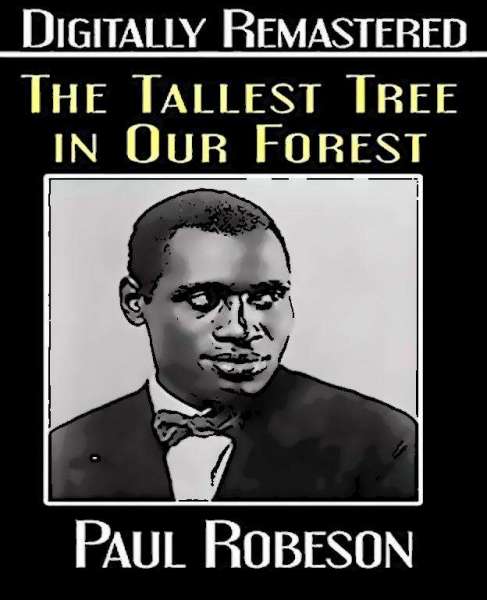The Tallest Tree in Our Forest is a american film of genre Documentary released in USA on 1 january 1977 with Paul Robeson
The Tallest Tree in Our Forest (1977)

If you like this film, let us know!
The Tallest Tree in our Forest is a 1977 documentary film directed and written by Gil Noble, about singer, actor and activist, Paul Robeson. The Tallest Tree was shot on 16mm film and was started shortly before Robeson's death at age 77 in 1976. The film features rare archival footage, interviews, and still photography throughout the twentieth century. The title is taken from a 1940s statement made by Mary McLeod Bethune describing Paul Robeson. The film was originally available in a three-part format for use on public-access television channels and in classrooms for ages fourteen and above.
Actors

Paul Robeson
(Self)

Harry Belafonte
(Self)
Comments
Leave comment :
Suggestions of similar film to The Tallest Tree in Our Forest
There are 35 films with the same actors, 8959 with the same cinematographic genres, 2422 films with the same themes, to have finally 70 suggestions of similar films.If you liked The Tallest Tree in Our Forest, you will probably like those similar films :
 , 30minutes
, 30minutesOrigin USA
Genres Documentary
Themes Films about television, Documentary films about business, Documentary films about the film industry, Documentaire sur une personnalité
Actors Paul Robeson, Sidney Poitier, Margaret Webster
Rating74%





 , 1h18
, 1h18Directed by Robert Greenwald
Genres Documentary
Themes Films about television, Documentary films about business, Documentary films about historical events, Documentaire sur une personnalité, Documentary films about politics, Political films
Actors George Carlin, Harry Belafonte, Al Franken, Jon Stewart, Ronald Reagan
Rating74%





The film examines the global growth of Murdoch's media enterprise in the context of concentration of media ownership considerations, and evaluates the effect of having one person in control of a large media conglomerate on freedom of the press.

Motherland (2010)
, 1h58Directed by Owen 'Alik Shahadah
Origin USA
Genres Documentary
Themes Films set in Africa, Films about slavery, Films about racism, Documentary films about racism, Documentary films about law, Documentary films about historical events, Documentaire sur une personnalité, Documentary films about politics, Political films
Actors Harry Belafonte, Abdulkadir Ahmed Said
Rating82%





Motherland is an epic documentary about the African continent from Ancient Egypt to the present. It is an overview of African history and contemporary issues but with the African people at the centre of the story. It is one of the first Pan-African features to be made.

Sing Your Song (2012)
Origin USA
Genres Biography, Documentary, Musical
Themes Films about music and musicians, Films about television, Documentary films about business, Documentary films about the film industry, Documentary films about music and musicians, Documentaire sur une personnalité, Musical films
Actors Sidney Poitier, Harry Belafonte, Marge Champion, Quincy Jones, Whoopi Goldberg, Russell Means
Rating74%





 , 1h20
, 1h20Origin USA
Genres Documentary
Themes Films about racism, Sports films, Documentary films about sports, Documentary films about racism, Documentary films about law, Documentaire sur une personnalité
Rating68%





Le 13 février 1993, la star du basket-ball de Bethel High School, Allen Iverson, est entrée dans un bowling de Hampton, en Virginie, avec plusieurs camarades de classe. Censée être une soirée ordinaire, c'est devenu une nuit qui a changé la jeune vie d'Iverson. Une bagarre a rapidement éclaté entre les jeunes amis noirs d'Iverson et un groupe d'hommes blancs plus âgés. Les retombées de la rixe et le déroulement du procès qui a suivi ont conduit le meilleur athlète de lycée du pays en prison et ont fortement divisé la ville selon des critères raciaux...
 , 1h48
, 1h48Directed by Brian Jamieson
Genres Documentary
Themes Medical-themed films, Films about television, Documentary films about business, Documentary films about the film industry, Documentaire sur une personnalité, Documentary films about health care, HIV/AIDS in film
Actors Nancy Kwan, Joan Chen, Bey Logan, France Nuyen, Vivian Wu, Ross Hagen
Rating70%





The film largely proceeds chronologically with Kwan serving both as the person being interviewed and as the narrator. Her colleagues in Hollywood were generally interviewed in Los Angeles. Her family members and companions in her youth were interviewed in Hong Kong.

Torn Memories of Nanjing (2009)
, 1h24Genres Documentary
Themes Documentary films about law, Documentary films about war, Documentary films about historical events, Documentaire sur une personnalité, Political films, Documentary films about World War II

Transcendent Man (2009)
, 1h23Directed by Robert Barry Ptolemy
Origin USA
Genres Documentary
Themes Documentaire sur une personnalité, Documentary films about technology
Actors William Shatner, Stevie Wonder
Rating70%





Raymond Kurzweil, noted inventor and futurist, is a man who refuses to accept the inevitability of physical death. He proposes that the Law of Accelerating Returns—the exponential increase in the growth of information technology—will result in a "singularity", a point where humanity and machines will merge, allowing one to transcend biological mortality: advances in genetics will provide the knowledge to reprogram biology, eliminate disease and stop the aging process; nanotechnology will keep humans healthy from the inside using robotic "red blood cells" and provide a human-computer interface within the brain; robotics, or artificial intelligence, will make superhuman intelligence possible, including the ability to back up the mind.

The Trial (2009)
, 1h12Genres Documentary
Themes Documentary films about law, Documentary films about war, Documentary films about historical events, Documentaire sur une personnalité
In September 1998, at the end of the Balkan wars, the military of Yugoslavia discovered 37 dead bodies in a concrete canal in western Kosovo. Seven years later, the Prime Minister of Kosovo would be falsely accused of their murder.
 , 59minutes
, 59minutesDirected by Camille Plagnet
Origin France
Genres Documentary
Themes Transport films, Rail transport films, Documentaire sur une personnalité, Documentary films about technology
The film portrays the turbulent life of the “Great Z”, an engine driver on the Abidjan - Ouagadougou line for twenty years. He was laid off in 1995 by the National Railways of Burkina Faso following the privatization imposed by the World Bank. A seasoned reveler and a hedonist to the bone, he suddenly finds himself with no reason to live. He has lost everything and lives a gloomy life while waiting for his retirement pension. Tormented and employing a brutal and violent vocabulary, he emphatically describes his problems, his hatreds and his hopes.
 Connection
Connection